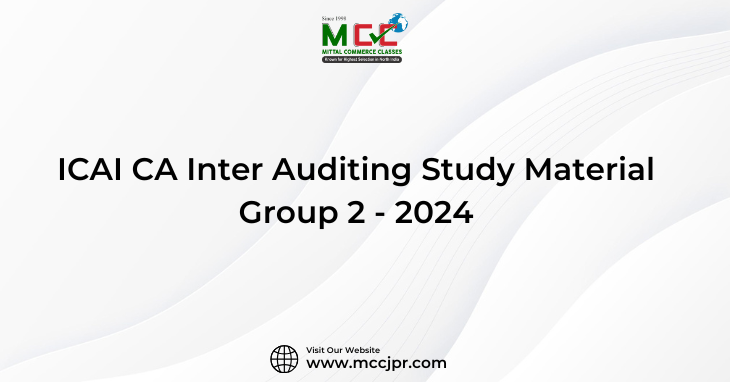An ICAI CA Inter audit is the examination of various books of accounts by an auditor followed by a physical examination of inventory to ensure that all departments are following a documented system of recording transactions. This is done to ensure the reliability of the financial statements provided by the organization.
Auditing is the core subject of the Chartered Accountant course. This is not a theoretical topic, but a practical one. Audit is recognized as the most difficult subject in CA Inter. This subject is the most competitive as a person cannot study this subject on his own. Knowledge gained in subjects such as accounting, corporate and other laws helps in understanding auditing. This is a very important subject, the knowledge of which helps students become better professionals.
Why is Auditing called the toughest subject In CA Inter?
Auditing is considered to be the most difficult subject in the CA Inter Syllabus. And for many students find independent study competitive and challenging. This is so because it involves very broad and technical concepts. Many students find it very difficult to master this subject. A range of reasons why this subject is difficult may include:
- The examiner will expect you to present yourself in normal bookish language, which may be difficult for some students.
- This subject is filled with numerous concepts and technical topics that are quite difficult to understand.
- This subject has a higher failure rate with very low average marks and can therefore pose a real threat. This obviously shows how difficult it is to score in this particular subject.
- Audit subject is updated at every specified interval and continuously add new topics to the syllabus.
Also Read: Best CA Inter Coaching In India
Let’s Talk About Auditing Study Material
Auditing and Ethics is also divided into two modules, i.e., Module 1 and Module 2. Whereas, Module 1 contains 5 chapters, Module 2 contains 6 chapters.
| Modules | No. Of Chapters |
| Module 1 | Chapter 1: Nature, Objective and Scope of Audit |
| Chapter 2: Audit Strategy, Audit Planning and Audit Programme | |
| Chapter 3: Risk Assessment and Internal Control | |
| Chapter 4: Audit Evidence | |
| Chapter 5: Audit of Items of Financial Statements | |
| Module 2 | Chapter 6: Audit Documentation |
| Chapter 7: Completion and Review | |
| Chapter 8: Audit Report | |
| Chapter 9: Special Features of Audit of Different Type of Entities | |
| Chapter 10: Audit of Banks | |
| Chapter 11: Ethics and Terms of Audit Engagements |
Who can do Auditing?
Sub-section (1) of Section 141 provides that a person is eligible to be appointed as the auditor of a company only if he is a chartered accountant.
The audit must be conducted by a practicing licensed certified public accountant (CA). The auditor must submit a tax audit report in the following format: Form 3CA: When a company is already required to audit its accounts under any law.
The purpose of an audit is to form a view of whether the information presented in the financial report generally reflects the financial position of the entity at that date, for example: Does it detail what the entity owns and does? Is the debt reflected correctly on the balance sheet?
An audit can be performed internally by the organization’s employees, or externally by a third-party firm, a certified public accountant (CPA).
Tips to Score Good in Auditing – Most difficult subject in CA Inter
- The first step you need to take is to ignore all the myths you have heard on the subject. Stay confident and try to study the subject while keeping your mind wide open. Don’t think this topic is too difficult.
- To master the subject, you need to study each of the topics thoroughly and develop a habit of repetition, memorizing every fine detail.
- This subject needs to be studied regularly without gaps. Furthermore, you must devote a certain percentage of time to this subject every day. Otherwise, spaces can disrupt the flow of observation.
- Flowcharts and diagrams make learning easy. Additionally, they will help you understand the application of the theme. Furthermore, to better grasp the concepts, try learning with diagrams and flowcharts.
- Observe in which topics you are stronger and in which you are weaker. Try to strengthen your strengths and restore where you are lacking.
Conclusion
No matter how difficult the subject may be, you will have to rise to the top despite all these difficulties for the sake of your career and a better future. So, you should follow several methods to gain control over auditing in your CA Intermediate. These strategies will help you build confidence in the subject by reducing the risk of failure. After all, success begins within yourself.
To score more points, you should also start studying with a group of the best teachers. Mittal Commerce Classes has the best group of educators for CA applicants. Here you will find the best CA Preparation courses under the guidance of the best teachers.
Frequently Asked Questions
Q1: Who can conduct an audit?
Ans: In India, Chartered Accountants from ICAI, or the Institute of Chartered Accountants of India, can also conduct independent audits of any organization. A CPA, or certified public accountant, conducts audits in the United States.
Q2: What is the role of an accountant?
Ans: The main role of an accountant is to perform a variety of tasks, including tax preparation, financial planning and auditing.
Q3: What are Auditing skills?
Ans: Auditing skills are naturally developed or acquired abilities that enable a person to perform auditing tasks accurately and skillfully.
Q4: What are examples of Auditing skills?
Ans: Here are some examples of skills that auditors often use:
Communication skills
- Financial skills
- Analytical skills
- Attention to detail
- Deadline adherence
- Critical thinking












